
|
|
Abstract: Links to five Youtube videos in English and Spanish, including "Mírzá Mihdí: The Purest Branch," "Mírzá Mihdí: La Rama Más Pura," "Historia de la Familia Khamsi, un Legado de Servicio," and "Life and Martyrdom of Varqá and Rúhu’lláh." Notes: See also Mirza Mihdi: The Purest Branch. Language: English and Spanish. |
Audio-Video Presentations:
Mirza Mihdi; historia de la familia Khamsi; Varqá and Rúhu'lláh
by Boris Handal
2020| See also youtube.com/user/borishandal. | ||
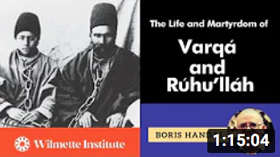
|
The Life and Martyrdom of Varqá and Rúhu’lláh (July, 2021) |
This is the extraordinary story of a father and a son who arose in the 19th century to spread the Faith of Bahá’u’lláh throughout Iran with indomitable strength and resilience. Varqá the father, a physician and a talented poet, and his gifted adolescent son Rúḥu’lláh, both of penetrating spiritual insight, took the New Gospel with zeal and courage to a generation blind in the most dire fanaticism. Operating in the midst of a country sunk into corruption and bigotry, Varqá and Rúhu’lláh were able to teach both the rich and the poor, the prince and the commoner, the scholar and the illiterate, the believer and the laic, in freedom or in prison. Their saga ended with their tragic martyrdom in the royal prison of Tehran in 1896 but has continued to live like a legend inspiring Bahá’ís around the world to serve. |
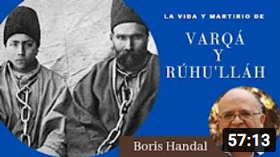
|
Vargá y Rúhu'lláh, vida y martirio (July, 2021) |
Esta es la extraordinaria historia de dos personajes icónicos de la historia bahá'í, donde se pone de manifiesto, en su más alto grado, el amor filial, el amor paternal; pero, por sobre todo, el amor y la fidelidad a Dios. Solo comparable con las historias de los grandes mártires de todas las religiones del pasado. |
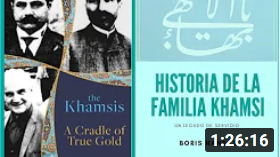
|
Historia de la Familia Khamsi, un Legado de Servicio (December, 2020) |
La familia Khamsi, devota y fiel seguidora de Bahá'u'lláh, fundador de la Fe Bahá'í, tuvo entre sus descendiente de tercera generación al muy querido y recordado Masúd Khamsi. Este siervo consagrado, encarnó en vida, las enseñanzas de unidad y amor a la humanidad y sembró en los corazones de miles de almas la semilla de la verdadera vida. Su legado entre los pueblos indígenas de Bolivia y Perú nunca será olvidado. Esta hermosa charla, es un tributo de cariño y gratitud eternos hacia su persona. Boris Handal, renombrado investigador de la historia bahá'í nos deleita y transporta al pasado haciéndonos conocer pasajes no conocidos de esta maravillosa familia. |
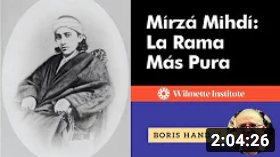
|
Mírzá Mihdí: La Rama Más Pura (Spanish) (June, 2020) |
Esta presentación familiariza a los participantes con la vida de Mírzá Mihdí, cuyo sacrificio fue levantado por Bahá’u’lláh a la misma estación que los grandes sacrificios en la historia de las grandes religiones de la humanidad. Era el hijo menor de Bahá’u’lláh y Asíyih Khánum. Nacido en Teherán en 1848, Mírzá Mihdí se separó de sus padres cuando fueron exiliados a Bagdad en 1852. Se unió a sus padres en Bagdad en 1860 y luego sufrió tres exiliados sucesivos con su Padre en los próximos diez años para finalmente ser encarcelado en el ciudad-prisión de 'Akká en 1868. Cuando Mírzá Mihdí se cayó de un tragaluz en el techo de la prisión donde él, su familia y muchos bahá'ís fueron encarcelados con la Manifestación de Dios, resultó gravemente herido y murió por sus heridas. Cuando su Padre le ofreció vivir, él eligió sacrificarse para que se abrieran las puertas de la prisión y aquellos que ansiaban ver a Bahá'u'lláh alcanzar su deseo. |
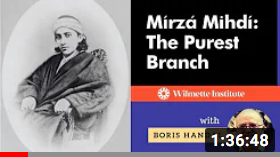
|
Mírzá Mihdí: The Purest Branch (May, 2020) |
This presentation familiarizes participants with the short life of Mírzá Mihdí whose sacrifice was raised by Bahá’u’lláh to the same station as the great sacrifices of humanity's religious history. He was the youngest son of Bahá’u’lláh and Asíyih Khánum. Born in Tehran in 1848, Mírzá Mihdí was separated from his parents when they were exiled to Baghdad in 1852. He joined his parents in Baghdad in 1860 and then suffered three successive exiles with his Father over the next ten years to finally be imprisoned in the city-prison of ‘Akká in 1868. When Mírzá Mihdí fell from a skylight in the roof of the prison where he, his family and many Bahá'ís were imprisoned with the Manifestation of God, he was severely injured and likely to die from his injuries. When offered his life by his father, he chose instead to sacrifice it so that the doors of the prison might open and those who longed to see Bahá'u'lláh attain their desire. Presenter: Dr Boris Handal is a Professor of Education at the University of Notre Dame Australia. His publications comprises over 100 conference and journal papers, books and book chapters published in Australia, the United States of America, Europe, Latin America, Africa and Southeast Asia. Dr Handal has also published several books in the field of 19th Century Persian history and culture. |
|
|